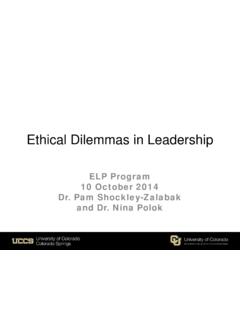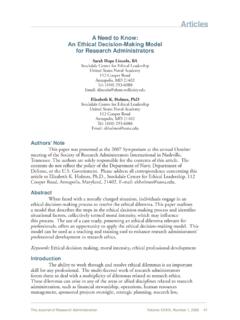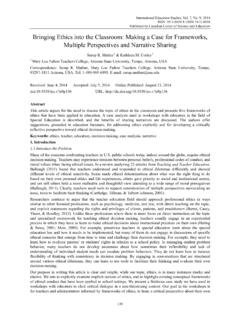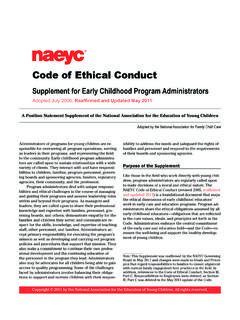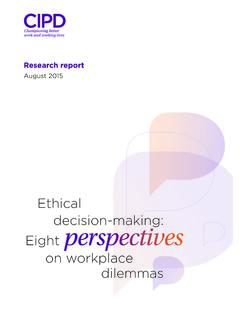Transcription of Principles and Standards of Ethical Supply Management ...
1 Principles and Standards of Ethical Supply Management Conductwith GuidelinesPublished by:Institute for Supply Management , W. Derry, Chief Executive Officer 2020 Institute for Supply Management 309 W. Elliot Road, Suite 113 Tempe, AZ rights reserved. Material may be copied and used with permission, with credit given to ISM. Printed in the United States of AND Standards OF Ethical Supply Management CONDUCT WITH GUIDELINESTABLE OF CONTENTSE xecutive Summary _____1 1. Impropriety _____1 2. Conflict of Interest _____2 3. Influence _____2 4. Responsibilities to the Employer _____4 5. Supplier and Customer Relationships _____5 6. Social Responsibility and Sustainability _____ 5 7. Confidential and Proprietary Information _____6 8. Reciprocity _____7 9. Applicable Laws, Regulations and Trade Agreements _____8 10. Professional Competence _____9 Acknowledgements _____9 iiPRINCIPLESI ntegrity in Your Decisions Actions Value for Your Employer Loyalty to Your ProfessionThese Principles are the foundation for Institute for Supply Management s (ISM ) Standards of Supply Management conduct:GUIDELINES1.
2 IMPROPRIETY: Prevent the intent and appearance of unethical or compromising conduct in relationships, actions and CONFLICT OF INTEREST: Ensure that any personal, business and other activities do not conflict with the lawful interests of your INFLUENCE: Avoid behaviors or actions that may negatively influence, or appear to influence, Supply Management RESPONSIBILITIES TO YOUR EMPLOYER: Uphold fiduciary and other responsibilities using reasonable care and granted authority to deliver value to your SUPPLIER AND CUSTOMER RELATIONSHIPS: Promote positive supplier and customer SUSTAINABILITY AND SOCIAL RESPONSIBILITY: Champion social responsibility and sustainability practices in Supply CONFIDENTIAL AND PROPRIETARY INFORMATION: Protect confidential and proprietary RECIPROCITY: Avoid improper reciprocal APPLICABLE LAWS, REGULATIONS AND TRADE AGREEMENTS: Know and obey the letter and spirit of laws, regulations and trade agreements applicable to Supply PROFESSIONAL COMPETENCE: Develop skills, expand knowl-edge and conduct business that demonstrates competence and pro-motes the Supply Management AND GUIDELINESE xecutive SummaryEthical companies are more profitable, create better brand and shareholder value, attract top innovative talent, build customer and supplier loyalty, and experience fewer expensive lawsuits.
3 As the Supply Management profession has become a strategic influencer, every action within the Supply chain has consequences. Given that, Supply Management professionals have the oppor-tunity and obligation to model and communicate Ethical behavior across the entire Supply chain. This document is intended to offer a compass for Supply Management for Supply Management (ISM ) recognizes 10 foundational princi-ples of Ethical behavior. From these Principles , guidelines are established to (1) encourage adherence to uncompromising Ethical behavior, (2) increase aware-ness and acceptance of Ethical conduct and (3) emphasize the role of ethics when formulating decisions. A distinguishing characteristic of a profession is that practitioners combine Ethical Standards with the performance of technical skills. A set of 10 Ethical Principles and Standards exists within the Supply Management field to guide individual and group decisions and actions.
4 These Principles can be categorized into four different areas: Personal Behavior; Interactions with Others; Laws, Regulations and Standards ; and leadership . The Supply chain professional has the unique position within and across organizations and cultures to model exemplary Ethical behavior, as follows:PERSONAL BEHAVIORS:Conflict of Interest, Influence, Reciprocity, Impropriety Within a Supply chain, individuals confront multiple situations with potentially grave consequences. As these situations occur, the Supply Management profes-sional will be equipped to recognize Ethical dilemmas, and have an effective way to deal with them. When these complex situations arise, this document offers suggestions for Supply Management professionals to avoid conflict of interest, impropriety, reciprocity and issues of With OthersSupply Management involves effective, value-driven interactions between prac-titioners and their employers, Management , suppliers, customers and other stakeholders.
5 Often, these relationships involve highly complex matters and multiple cultures, which creates even more room for opportunities and mis-understanding. In these situations, the Supply Management professional will navigate a range of Ethical considerations and should ensure that collaborations and expectations are balanced and fair. 2 Regulatory Compliance & StandardsMost Supply chain professionals are aware that adherence to all applicable laws, regulations and Standards is a critical part of their job. Given the increasing globalization of the Supply chain, it is imperative for the Supply Management pro-fessional to stay current and knowledgeable of laws and regulations. Additional emphasis must be placed on social responsibility and sustainability within the Supply competencyToday, Supply Management leadership encompasses at least two components. The first is continuous development leveraging skills, experiences and edu-cation to become a forward-thinking, value-driven professional.
6 The second component is that Supply chain managers must do more with less for their organizations and the global marketplace. This kind of leadership helps increase value to organizations through cost savings, brand strengthening and customer engagement. Every Supply Management professional should accept and adhere to these Ethical Standards . Organizations are encouraged to develop, publish and enforce an ethics policy that supports these Principles and Standards . Policies and pro-cedures must be clear, transparent and enforceable. The ethics policy should be shared with stakeholders throughout the Supply chain. Training must be ongoing and IMPROPRIETYI nteraction between Supply professionals and stakeholders must be honest, transparent and equitable. Avoid any action or appearance of unethical or compromising behavior in all relationships and commu-nications.
7 Consequences of a perceived impropriety can be the same as consequences of an actual impropriety. Guidelines for avoiding and preventing impropriety: Maintain business professionalism in all communications written, verbal and social media. Identify situations which, even through unanticipated circumstances, may negatively impact business and/or stakeholders. Discuss any actual or potential impropriety with Management . Determine a course of action. Encourage behaviors that help to create a culture of integrity throughout the Supply chain. Understand and adapt all communications to adhere to industry and orga-nizational Standards , as well as cultural considerations. Carefully consider discussions of personal matters with business colleagues, customers and suppliers. 32.
8 CONFLICT OF INTERESTA void using your position as a Supply Management professional for personal gain or in a manner that places your employer in legal or reputational Management professionals must not use their positions to influence another person or to provide inappropriate benefits to themselves or others. Potential conflicts can arise from family, business, personal or financial relation-ships. Even though a conflict may not technically exist, Supply Management professionals must avoid the appearance of a conflict of for avoiding and preventing conflicts of interest: Safeguard information that you have access to as Supply Management pro-fessional. Do not use information for your own gain or to provide an unfair advantage to a supplier or stakeholder. Discuss any actual or potential conflict of interest with Management . Determine a course of action.
9 Reassign Supply Management responsibili-ties as warranted. Proactively disclose to your employer any potential conflict of interest or financial interest involving any project, supplier, contractor or business related to your official position. Encourage employers and suppliers to adopt conflict-of-interest procedures that requires employees to disclose any potential conflict of interest upon employment and annually thereafter. Do not engage in inappropriate personal business (which includes invest-ment, equities and other financial interests) with your employer, employer s competitors or suppliers. For example, lending money to, or borrowing money from, any customer or supplier. 3. INFLUENCEI nfluence is a factor in almost all business decisions, especially in the Supply chain. Use care to evaluate the intent and perception of influ-ence on Supply Management decisions.
10 Avoid behaviors or actions that are unfair or unbalanced or appear to influence Supply Management decisionsInfluence can be both internal and external:1) Influence that the Supply Management professional has over suppliers, customers and other stakeholders2) Influence toward the Supply Management professional from suppliers, customers and other person that influences a Supply decision must avoid all activity that may diminish, or even appear to diminish, decision-making objectivity. Interests of the employer must be served by those who are a part of the Supply process. Guidelines cannot cover every situation and do not take the place of good 4judgment or sensitivity to other cultures, laws, customs and practices. Sources of influence can be introduced into relationships between buyers and sellers. This can occur as a singular event or over time.

